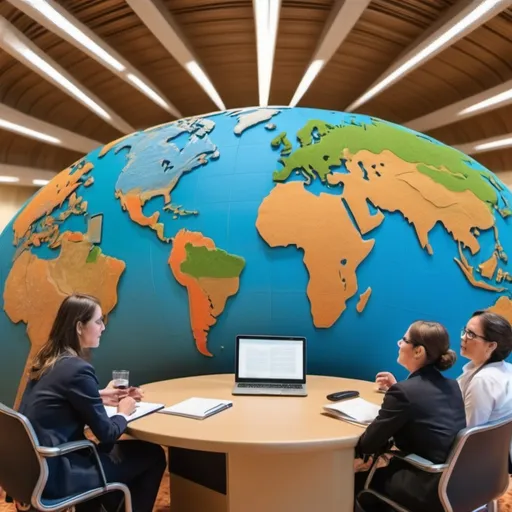Attending conferences is a fantastic opportunity for professionals, researchers, and students to gain new knowledge, network with experts, and showcase their work on a global stage. However, the cost of travel, accommodation, and registration can be a barrier for many individuals. Travel grants are a valuable resource that provide financial support to help cover these expenses, making it possible for people to attend important conferences in fields like technology, health, and the arts.
In this article, we’ll explore the various types of international travel grants available, how to apply for them, and tips to increase your chances of receiving one.
What Are Travel Grants?
Travel grants are financial awards designed to help individuals attend conferences, seminars, workshops, or other professional events. These grants can cover various costs, such as:
- Travel Expenses: Costs associated with flights, trains, buses, or other modes of transportation.
- Accommodation: Funding for hotels, hostels, or other lodging options.
- Conference Fees: Some grants cover registration fees required to attend or present at conferences.
- Daily Expenses: Some grants may include a per diem to cover meals and other daily necessities.
Grants are offered by a wide range of organizations, including academic institutions, government agencies, private foundations, non-profits, and professional societies.
Why Apply for Travel Grants?
Travel grants offer significant benefits to professionals and students who wish to attend international conferences but may not have the financial resources to do so. Here’s why applying for a travel grant can be worthwhile:
- Networking Opportunities: Conferences allow you to connect with experts, potential collaborators, and industry leaders from around the world.
- Career Advancement: Attending conferences can help you stay updated on the latest trends and innovations, making you more competitive in your field.
- Exposure to Global Perspectives: By attending international conferences, you gain access to diverse viewpoints, fostering a richer understanding of global issues.
- Sharing Your Work: For researchers and academics, conferences are a platform to present your findings and receive feedback from peers.
- Access to Cutting-Edge Research: Conferences often feature presentations on the latest research, technologies, and techniques.
If you need more explanation or more information, you can book a consultation and speak to Happy Face
Types of Travel Grants for Conferences
Depending on your field of work, the type of grant you apply for may vary. Below are some common categories of travel grants for international conferences:
1. Technology Conferences
Technology-focused travel grants support professionals and students in fields like computer science, engineering, data science, and cybersecurity. These grants are usually offered by tech companies, academic institutions, or industry associations. For example:
- Google Travel and Conference Grants: Google offers travel grants to underrepresented groups in the tech industry, such as women and minorities, to attend major technology conferences like Grace Hopper Celebration and IEEE conferences.
- IEEE Student Travel Grants: The Institute of Electrical and Electronics Engineers (IEEE) offers travel grants to student members presenting papers at their conferences.
- ACM SIGPLAN: The Association for Computing Machinery’s Special Interest Group on Programming Languages (ACM SIGPLAN) provides travel funding for students to present at their conferences.
2. Health and Medical Conferences
Health and medical conferences gather professionals from various specializations, including public health, medicine, nursing, and pharmacy. Many organizations in the health sector offer travel grants to ensure broader participation in important health discussions. Examples include:
- NIH Travel Grants: The National Institutes of Health (NIH) provides funding for early-career scientists and students to attend health-related conferences worldwide.
- Global Health Corps Fellowship: This program provides travel grants to individuals passionate about addressing health equity at conferences focused on global health challenges.
- Society for Neuroscience (SfN) Travel Awards: SfN offers travel grants to its members, including graduate students and postdocs, to attend the society’s annual meeting.
If you need more explanation or more information, you can book a consultation and speak to Happy Face
3. Arts and Humanities Conferences
Travel grants for the arts and humanities are available to artists, researchers, and educators involved in literature, visual arts, performing arts, and cultural studies. These grants help individuals attend festivals, academic conferences, and exhibitions to exchange ideas and collaborate with peers globally. Examples include:
- Getty Foundation Travel Grants: The Getty Foundation offers travel grants to scholars and researchers working in the fields of art history and conservation. The grants support attendance at international symposia and conferences.
- British Council Arts Travel Grants: This program supports artists and cultural practitioners from the UK and abroad in attending international events that promote cross-cultural exchange in the arts.
- Terra Foundation for American Art: Terra offers grants for scholars and artists focused on American art to attend or present at international conferences.
How to Apply for Travel Grants
Applying for travel grants can be competitive, but with a clear plan and well-prepared application, your chances of success will increase. Here’s a step-by-step guide on how to apply:
1. Identify Relevant Grants
Start by researching travel grants that fit your field and the specific conference you want to attend. Many grants are tailored to specific disciplines, so make sure you’re applying to ones that align with your area of expertise.
2. Read the Guidelines Carefully
Each grant has its own set of rules and eligibility requirements. Make sure to read the guidelines carefully to understand what’s expected in terms of documentation, deadlines, and eligibility criteria (e.g., student status, nationality, underrepresented group status).
3. Prepare Your Application Materials
Most grant applications require several key documents, including:
- A Statement of Purpose: Explain why you want to attend the conference, how it aligns with your professional goals, and why you need financial assistance.
- Budget Estimate: Provide a detailed budget, showing how much you expect to spend on travel, accommodation, and registration fees.
- Resume or CV: Highlight your academic or professional background, relevant research, and achievements.
- Conference Abstract or Proposal: If you’re presenting at the conference, include your research abstract or presentation proposal.
- Letters of Recommendation: Some grants require letters of recommendation from professors, mentors, or supervisors to support your application.
If you need more explanation or more information, you can book a consultation and speak to Happy Face
4. Submit Before the Deadline
Ensure that your application is complete and submitted before the deadline. Late applications are typically not accepted, so it’s important to plan ahead.
5. Follow Up
After submitting your application, keep track of any communications from the grant provider. Some organizations may require additional information or interviews before making their decision.
Tips for Increasing Your Chances of Getting a Travel Grant
- Start Early: Many grants have deadlines several months before the conference date. Starting early gives you time to gather all the necessary materials and submit a polished application.
- Tailor Your Application: Customize your statement of purpose and other documents to align with the specific grant you’re applying for. Highlight how attending the conference will benefit both you and the wider community.
- Show Financial Need: Be clear about why you need financial assistance, especially if you’re a student or early-career professional with limited resources.
- Apply to Multiple Grants: Don’t put all your eggs in one basket. Apply to several different grants to increase your chances of receiving funding.
- Network and Seek Mentorship: Reach out to colleagues, professors, or past recipients who may have insights into successful grant applications. Their advice can be invaluable in refining your application.
If you need more explanation or more information, you can book a consultation and speak to Happy Face
International travel grants for conferences are a fantastic resource that can open doors to professional growth, learning, and networking. Whether you’re in technology, health, or the arts, these grants can make it financially feasible to attend global conferences that would otherwise be out of reach. By understanding the types of grants available, preparing your application carefully, and following best practices, you can increase your chances of securing funding and making the most of your conference experience.
Attending these events not only boosts your own career but also contributes to the global exchange of knowledge and innovation in your field.








